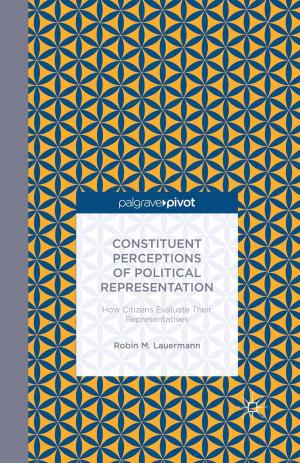Military Missions in Democratic Latin America
Nonfiction, Social & Cultural Studies, Political Science, International, International Security| Author: | David Pion-Berlin | ISBN: | 9781137592705 |
| Publisher: | Palgrave Macmillan US | Publication: | June 1, 2016 |
| Imprint: | Palgrave Macmillan | Language: | English |
| Author: | David Pion-Berlin |
| ISBN: | 9781137592705 |
| Publisher: | Palgrave Macmillan US |
| Publication: | June 1, 2016 |
| Imprint: | Palgrave Macmillan |
| Language: | English |
This book demonstrates through country case studies that, contrary to received wisdom, Latin American militaries can contribute productively, but under select conditions, to non-traditional missions of internal security, disaster relief, and social programs. Latin American soldiers are rarely at war, but have been called upon to perform these missions in both lethal and non-lethal ways. Is this beneficial to their societies or should the armed forces be left in the barracks? As inherently conservative institutions, they are at their best, the author demonstrates, when tasked with missions that draw on pre-existing organizational strengths that can be utilized in appropriate and humane ways. They are at a disadvantage when forced to reinvent themselves. Ultimately, it is governments that must choose whether or not to deploy soldiers, and they should do so, based on a pragmatic assessment of the severity and urgency of the problem, the capacity of the military to effectively respond, and the availability of alternative solutions.
This book demonstrates through country case studies that, contrary to received wisdom, Latin American militaries can contribute productively, but under select conditions, to non-traditional missions of internal security, disaster relief, and social programs. Latin American soldiers are rarely at war, but have been called upon to perform these missions in both lethal and non-lethal ways. Is this beneficial to their societies or should the armed forces be left in the barracks? As inherently conservative institutions, they are at their best, the author demonstrates, when tasked with missions that draw on pre-existing organizational strengths that can be utilized in appropriate and humane ways. They are at a disadvantage when forced to reinvent themselves. Ultimately, it is governments that must choose whether or not to deploy soldiers, and they should do so, based on a pragmatic assessment of the severity and urgency of the problem, the capacity of the military to effectively respond, and the availability of alternative solutions.















